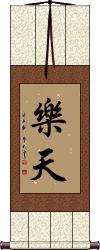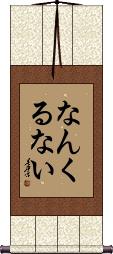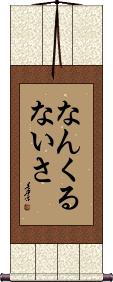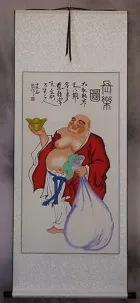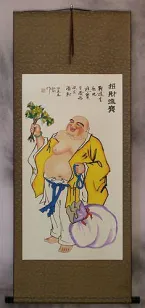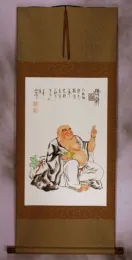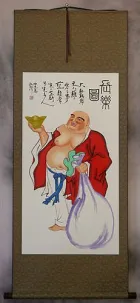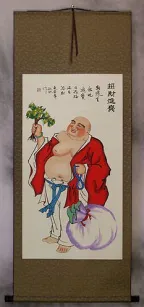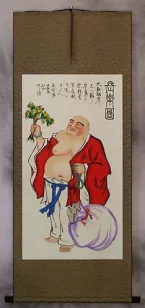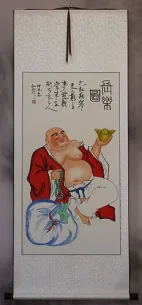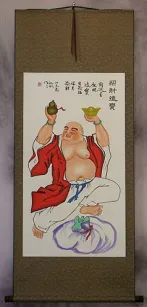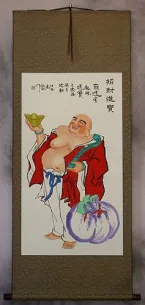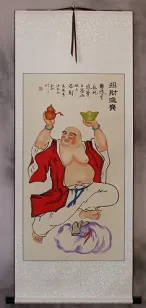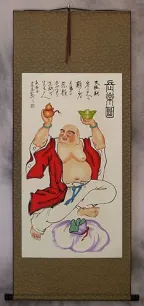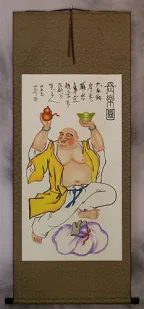Many custom options...
And formats...

Be Happy in Chinese / Japanese...
Buy a Be Happy calligraphy wall scroll here!
Personalize your custom “Be Happy” project by clicking the button next to your favorite “Be Happy” title below...
Be Happy
幸せである is a way to express the idea of “be happy” in Japanese.
Japanese grammar is far different than English, so the word order is the opposite of English. If you translated directly, you'd have something like “Happiness henceforth” or “Happiness hereafter.” The idea is to be happy from this moment on.
Note: Because this selection contains some special Japanese Hiragana characters, it should be written by a Japanese calligrapher.
Optimism / Happy With Your Fate
樂天 is about being optimistic and also making the best of whatever life throws at you.
This is hard to define. One dictionary defines this as “acceptance of fate and happy about it.” There is one English word equivalent, which is sanguinity or sanguinary.
You can also say that this means “Be happy with whatever Heaven provides,” or “Find happiness in whatever fate Heaven bestows upon you.” 樂天 suggests being an optimist in life.
Note: This is sometimes a given name in China.
![]() Please note that Japanese tend to write the first character in a slightly-different form (as seen to the right). Let us know if you have a preference when you place your order.
Please note that Japanese tend to write the first character in a slightly-different form (as seen to the right). Let us know if you have a preference when you place your order.
Don't Worry, Be Happy
なんくるない or nankurunai is an Okinawan word, written in Japanese that means “Don't worry, be happy.”
沖縄/Okinawa and/or the 琉球/Ryūkyū Islands have a more laid-back “island style” approach to life. So the nankurunai idea is a perfect match for that lifestyle.
Note: Because this title is entirely Japanese Hiragana, it should be written by a Japanese calligrapher.
Better to be Happy than Rich
安貧樂道 means “It's better to be happy than rich” in Chinese.
Even if you are poor, you should still feel satisfied in your life...
...Satisfaction, happiness and the meaning of your life come from within yourself and not from money or riches of the world.
In Chinese, there are a lot of four-character proverbs which express some very old philosophies.
Though there are only four characters on this scroll, in Chinese, the meanings often surpass the dictionary definition of each character.
In this case, you should not set your expectations too high for the money or riches you wish to have. One who sets their expectations too high is almost always disappointed. Instead, you should cherish what you have, seek to improve yourself from within, and not measure your worth by the size of your bank account.
Nankurunaisa
Everything will be all right, it will all work out one way or another
なんくるないさ or Nankurunaisa means “Everything will be all right” and/or “It will all work out one way or another.”
なんくるないさ is an Okinawan (琉球 / Ryūkyū Islands) word written in Japanese.
You might see this romanized with breaks like nankurunai-sa or nankuru-nai-sa. It's the same word either way. However, there is a separate word, なんくるない, in there which is nankurunai, translated as “Don't worry, be happy.” The “sa” or さ part indicates an assertion or interjection.
Note: Because this title is entirely Japanese Hiragana, it should be written by a Japanese calligrapher.
This in-stock artwork might be what you are looking for, and ships right away...
Gallery Price: $200.00
Your Price: $69.88
Not the results for be happy that you were looking for?
Below are some entries from our dictionary that may match your be happy search...
| Characters If shown, 2nd row is Simp. Chinese |
Pronunciation Romanization |
Simple Dictionary Definition |
喜 see styles |
xǐ xi3 hsi yoshimi よしみ |
More info & calligraphy: Happiness / Joyful / Joy(female given name) Yoshimi prīti; ānanda. Joy; glad; delighted, rejoice; to like. |
欣 see styles |
xīn xin1 hsin yoshi よし |
More info & calligraphy: Happy(personal name) Yoshi Joyful, elated, elevated. |
歡 欢 see styles |
huān huan1 huan kan かん |
More info & calligraphy: Joyful(personal name) Kan nanda. Pleased, glad. |
享福 see styles |
xiǎng fú xiang3 fu2 hsiang fu |
More info & calligraphy: Prosperous Life |
奇遇 see styles |
qí yù qi2 yu4 ch`i yü chi yü kiguu / kigu きぐう |
More info & calligraphy: Fortuitous Meeting(adj-na,adj-no,n) unexpected meeting; coincidence |
幸福 see styles |
xìng fú xing4 fu2 hsing fu koufuku / kofuku こうふく |
More info & calligraphy: Happiness(noun or adjectival noun) happiness; well-being; joy; welfare; blessedness; (surname, female given name) Shiawase |
快樂 快乐 see styles |
kuài lè kuai4 le4 k`uai le kuai le keraku |
More info & calligraphy: Joyfulness / HappinessJoyful. |
樂天 乐天 see styles |
lè tiān le4 tian1 le t`ien le tien rakuten |
More info & calligraphy: Lottedeva musicians, see above. |
阿魯巴 阿鲁巴 see styles |
ā lǔ bā a1 lu3 ba1 a lu pa |
More info & calligraphy: Aruba |
夫婦円満 see styles |
fuufuenman / fufuenman ふうふえんまん |
More info & calligraphy: Happy Marriage |
新年快樂 新年快乐 see styles |
xīn nián kuài lè xin1 nian2 kuai4 le4 hsin nien k`uai le hsin nien kuai le |
More info & calligraphy: Happy New Year |
生日快樂 生日快乐 see styles |
shēng rì kuài lè sheng1 ri4 kuai4 le4 sheng jih k`uai le sheng jih kuai le |
More info & calligraphy: Happy Birthday |
百年好合 see styles |
bǎi nián hǎo hé bai3 nian2 hao3 he2 pai nien hao ho |
More info & calligraphy: 100 Years of Happy Marriage |
なんくるない see styles |
nankurunai なんくるない |
More info & calligraphy: Don't Worry, Be Happy |
咍 see styles |
hāi hai1 hai |
(interj.); happy; sound of laughter |
哿 see styles |
gě ge3 ko |
excellent; happy; well-being |
媅 see styles |
dān dan1 tan |
content; happy |
忭 see styles |
biàn bian4 pien |
(literary) happy; delighted |
忺 see styles |
xiān xian1 hsien |
(literary) to want; to desire; (literary) pleased; gratified; happy |
忻 see styles |
xīn xin1 hsin kon |
happy Delight, joy. |
怡 see styles |
yí yi2 i i |
harmony; pleased happy |
恞 see styles |
yí yi2 i |
happy; joyous |
悆 see styles |
yù yu4 yü |
happy |
昪 see styles |
biàn bian4 pien |
(literary) (of sunlight) bright; (literary) happy; delighted (old variant of 忭[bian4]) |
欨 see styles |
xū xu1 hsü |
(literary) to blow or breathe upon; happy |
祝 see styles |
zhù zhu4 chu yoshi よし |
to pray for; to wish (sb bon voyage, happy birthday etc); person who invokes the spirits during sacrificial ceremonies (1) {Shinto} (See 宮司,禰宜・1,神主・2) junior Shinto priest; (2) (polite language) (rare) {Shinto} Shinto priest; generic title for a member of the Shinto priesthood; (surname) Yoshi To invoke, either to bless or curse. |
禑 祦 see styles |
wú wu2 wu |
happy; used in historical names |
訢 䜣 see styles |
xīn xin1 hsin |
pleased; delighted; happy; variant of 欣 |
豫 see styles |
yù yu4 yü yo |
happy; carefree; at one's ease; variant of 預|预[yu4]; old variant of 與|与[yu4] At ease; beforehand; prepared, v. 預 13. |
邴 see styles |
bǐng bing3 ping |
ancient city name; happy |
Click here for more be happy results from our dictionary
The following table may be helpful for those studying Chinese or Japanese...
| Title | Characters | Romaji (Romanized Japanese) | Various forms of Romanized Chinese | |
| Be Happy | 幸せである | Shiawa se de a ru Shiawasedearu | ||
| Optimism Happy With Your Fate | 樂天 / 楽天 乐天 | raku ten / rakuten | lè tiān / le4 tian1 / le tian / letian | le t`ien / letien / le tien |
| Don't Worry, Be Happy | なんくるない | nan ku ru nai nankurunai | ||
| Better to be Happy than Rich | 安貧樂道 安贫乐道 | ān pín lè dào an1 pin2 le4 dao4 an pin le dao anpinledao | an p`in le tao anpinletao an pin le tao |
|
| Nankurunaisa | なんくるないさ | nan ku ru nai sa nankurunaisa | ||
| In some entries above you will see that characters have different versions above and below a line. In these cases, the characters above the line are Traditional Chinese, while the ones below are Simplified Chinese. | ||||
Successful Chinese Character and Japanese Kanji calligraphy searches within the last few hours...

